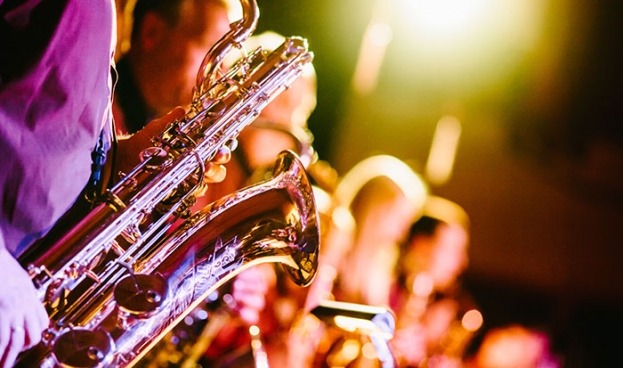We believe that democracy as a way of life can be strengthened and deepened through spiritual practices — both those traditionally considered to be "inner work" and those that require active engagement with our neighbors and communities.
— Spirituality and Practice: The Practicing Democracy Project
I’m listening to John Coltrane’s "Love Supreme" as I write this. It makes me think of St. John Coltrane Church in San Francisco. I live in Arkansas, but I think I am a member of the church, at least in spirit. I like the whole idea that people might sing along, clap, and dance to Coltrane’s "Love Supreme" on Sunday mornings, understanding it as a spiritual practice in its own right. As they dance they are putting on the mind of Coltrane and entering into Coltrane-consciousness; and many think of it as a kind of Christ-consciousness: open, free, celebratory, loving. Makes sense to me. I think Christ can be in Coltrane and Coltrane in Christ. Isn’t everything interconnected?
Let this mind be in you, which was also in Christ Jesus.
— Philippians 2:5
But let’s be honest. Not all Americans want to put on the mind of Christ or Coltrane. We are a religiously diverse nation, and the very language of jazz will speak to some but not all. But given that America is the birthplace of jazz, might it be possible that each of us, and perhaps even all of us, could put on the mind of jazz for the sake of practicing democracy, even if it’s not Coltrane’s variety?
Please don’t worry if you don’t like jazz. My wife doesn’t either. She teasingly says that every time she hears a jazz solo it makes her want to slap somebody. In her words: "You can’t sing along; the chords are dissonant; and it goes on and on forever without ever coming to an end." I tell her that we need not go to jazz bars on Saturday nights lest we end up in jail on Sunday mornings. I say to her: "It is enough to enjoy the idea of jazz."
I want to say this to you, too. Admittedly, I am a jazz enthusiast and in my more extravagant moments I entertain the idea that it might be good for everybody to listen to improvisational jazz at least once a day for twenty minutes, even if only as a kind of ascetical practice. Here is my argument.
- Listening to jazz on daily basis could help widen our sense of harmony so that we can better appreciate the many voices of our world, some of which are very different from our own.
- It could help us become more tolerant of ambiguity so that we would not always want to divide the world into tightly-knit compartments.
- It could help us become open to surprise so that we don’t feel we had to control everything.
One of America’s leading jazz critics, Gary Giddings, says that jazz musicians have two goals: "Creating music that keeps listeners wondering what’s next, and finding a novel context within which to explore old truths." I think the world would be a better place if we didn’t always have to know what comes next.
Nevertheless, in my wiser moments, I realize there are additional ways of becoming more grateful for diversity, tolerant of ambiguity, and open to surprise. Life itself can be a teacher. So I ask you to consider the possibility that the mind of jazz and the idea of jazz might help offer some important lessons in life, even if you never want to listen to a single note of it.
The mind of jazz is an open-mind. It is relaxed yet alert, hospitable to strangers, delighted by surprise, honest about suffering, and yet trusting in fresh possibilities. It is a hopeful mind. The idea of jazz is like the idea of a diverse and inclusive community. The founder of modern Pakistan, Muhammad Iqbal, called it spiritual democracy. It is the image of people coming together, listening to one another, respecting one another’s talents, and trying to create something beautiful together. They are free to express themselves as individuals, having been given the opportunity to develop their unique creative potentials. And yet they also have the humility to let others solo without having to be the center of attention. They are accountable for themselves and to one another, yet they are also forgiving, making the best of their own and other's mistakes. Most importantly they have faith. As they play together they trust in the availability of fresh possibilities.
In a world filled with so much violence and suffering, it would be a good idea if a lot of people lived this jazz-like way. It would be good if people in households, workplaces, neighborhoods, villages, nations and listened to one another and worked together with a spirit of forgiveness, humility, creativity, and respect. And certainly it would help if they tried to make music with other animals and the earth honoring the unique voices of the more-than-human world. Surely this is one of our higher callings as a species. Cats are called to purr, dogs to bark, fish to swim, and birds to fly. We humans have our limitations. But perhaps our calling is to dwell in harmony with one another and the earth.
Yes, for these reasons alone, wouldn't it be good if, each in our own way, we put on the mind of jazz, even if we never want to hear a lick of John Coltrane? Wouldn't that contribute to a Love Supreme? And isn’t that, after all, what we’re after?

 Jazz and the Spirit of Democracy
Jazz and the Spirit of Democracy